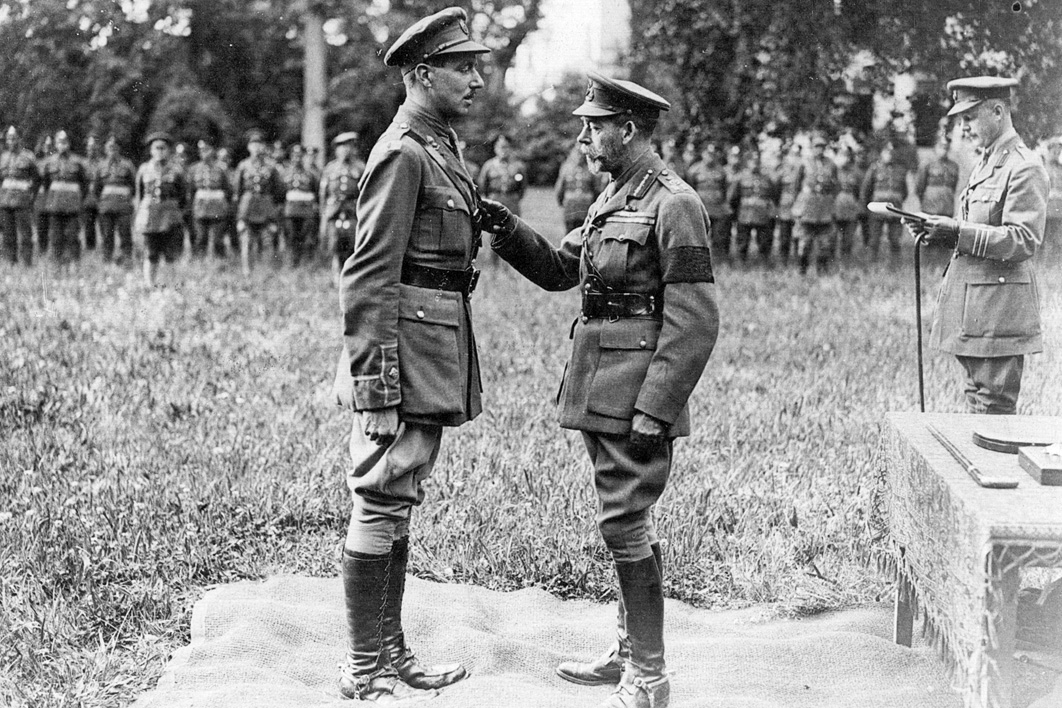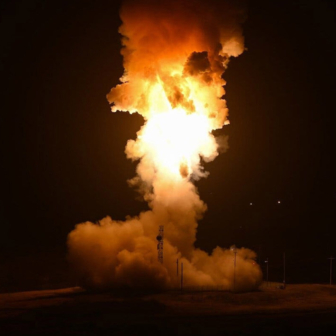In June 2012 Australian special forces fighting in Afghanistan led a five-day operation to reinforce security around the southern city of Kandahar. Operation Hamkari had the job of clearing a Taliban stronghold in the Shah Wali Kot district in the north of Kandahar province, with the Australians fighting alongside Afghan National Army forces and backed by US army helicopters.
After an initial assault by soldiers from the 2nd Commando Regiment on 10 June, reinforcements from the Special Air Service Regiment were called the next day to the hamlet of Tizak as the Taliban prepared to counterattack. The fighting was intense, with the SAS troopers under heavy fire from the moment they alighted from their helicopters.
At the height of the thirteen-hour battle, an SAS corporal led an assault against an enemy fortification. When members of his patrol were pinned down by Taliban fire, he exposed his own position to draw the fire away from his comrades then, fighting at close range, stormed two enemy machine-gun posts and silenced both of them.
The following January, back in his home town of Perth, Ben Roberts-Smith was presented with the Commonwealth’s highest and most revered award for gallantry, the Victoria Cross. According to the citation for the award, “his selfless actions in circumstances of great peril served to enable his patrol to break into the enemy’s defences and regain the initiative… resulting in a tactical victory.”
The award would transform Ben Roberts-Smith from an anonymous soldier into a national celebrity. After leaving the army in 2013, he was named Australian Father of the Year, appointed chair of the National Australia Day Council and honoured as number-one ticketholder of the Fremantle Dockers. On completing an MBA at the University of Queensland, he became a senior executive with Kerry Stokes’s Seven television network and a star performer on the lucrative corporate speakers’ circuit. Lauded wherever he travelled as a hero and an exemplary role model, he was much sought after as a business consultant and an adviser to governments.
Now that celebrity has been engulfed by allegations that may yet end in infamy for Ben Roberts-Smith. In 2017, investigative journalists Chris Masters and Nick McKenzie revealed the first details of allegations implicating the former SAS soldier in a series of war crimes in Afghanistan. Last month the two journalists reported that the Australian Federal Police had referred Roberts-Smith to the Commonwealth Director of Public Prosecutions to face possible charges. The Sydney Morning Herald subsequently reported that the DPP had appointed Sydney barrister David McClure SC to examine the case for proceeding to prosecution.
According to Masters and McKenzie, the AFP’s brief of evidence outlined allegations that Roberts-Smith had kicked a defenceless prisoner off a cliff during a special forces operation in Afghanistan in 2012, and covered up his subsequent murder, and that fellow SAS soldiers had witnessed the future VC recipient’s involvement in the murder of other defenceless Afghans. In addition to the AFP investigations, an extensive internal military inquiry led by NSW Supreme Court of Appeal judge Paul Brereton is soon to hand down a report into these and other alleged war crimes in Afghanistan.
Roberts-Smith has vehemently protested his innocence, claiming that the reporting has branded him a murderer and deriding the allegations as “recklessly untrue.” He told the Australian in December, “I have put my family name and medals on the line to sue Nine [publisher of the Age and the Sydney Morning Herald] and restore my reputation.” But his decision to sue the Age and the Sydney Morning Herald for defamation may have compounded his problems.
While the start of the trial has been delayed because of the pandemic, fresh witness statements submitted in the Federal Court in early June claimed Roberts-Smith was involved in seven unlawful killings in Afghanistan. Counsel for the newspapers, Sandy Dawson SC, told the court Roberts-Smith and another unnamed soldier had kicked a handcuffed man, Ali Jan, off a cliff in the village of Darwan in September 2012 and that either he or another soldier had subsequently shot and killed the prisoner.
The implications of the case run far deeper than the reputation of one man, the jealously guarded pride of the elite Special Air Service Regiment and the honour of all Australian military forces. It could have consequences around the world for holders of a hallowed band of crimson ribbon like the one that sat above the breast pocket on Ben Roberts-Smith’s army tunic — and Australia’s long and storied association with the Victoria Cross.
It was at the end of the Crimean war, in 1856, that Queen Victoria decided a new honour was needed to recognise the remarkable acts of heroism that had been reported during the great victory by Britain and its allies over the Russians. The medal she authorised would become the highest award in the imperial honours system. In the order of precedence it outranks even the Most Noble Order of the Garter — the highest order of knighthood — which is confined to the reigning sovereign, the Prince of Wales and no more than twenty-five others. Yet from the outset, the Victoria Cross was intended to be both exceptional and egalitarian.
Victoria insisted that it stand out for its humble simplicity: a plain bronze cross struck from captured cannon metal (not from the Crimea as folklore has it, but from the colonial wars in China) suspended on a plain crimson ribbon. And at her direction, it was to be blind to class and seniority. Its awarding would be influenced by “neither rank, nor long service, nor wounds, nor any other circumstance or condition whatsoever save the merit of conspicuous bravery.”
But the criteria for its awarding were far from modest. The VC was to recognise only “the most conspicuous bravery, or some preeminent act of valour or self-sacrifice in the presence of the enemy.” In modern times, the perception in military circles is that the VC can be earned only by a member of the armed forces who lays his or her life on the line in a situation of clear and present danger in combat. It often has been awarded posthumously.
Since its inception, the medal has been won 1358 times. Each of those awards is revered in the military (a general will salute a private displaying the ribbon) and exulted in popular perception. And those medals not locked away in museums and private collections can fetch staggering prices at auction. In 2006 Kerry Stokes paid a world record price of $1.2 million for the medals of Captain Alfred Shout — who was posthumously awarded the VC for his bravery during the Battle of Lone Pine at Gallipoli — and then donated them to the Australian War Memorial.
But the prestige of the VC and the instant celebrity it confers on those who win it are, so to speak, a double-edged sword. Those who so distinguish themselves in battle invariably are expected to lead exemplary lives in peacetime. And it can be a dizzying height from which to fall for any of them who fail to live up to that onerous standard. Here lies the potential challenge for the Australian government in the event that Ben Roberts-Smith is unable to clear his name.
During its 164-year history, the VC has been forfeited just eight times for serious misconduct: twice for desertion, five times for theft and assault and once for bigamy. But while many more recipients have publicly fallen from grace after coming home from battle, none have had their honour revoked since 1920, when King George V declared his displeasure at the practice.
As George’s private secretary, Lord Stamfordham, would write, “The King feels so strongly that, no matter the crime committed by anyone on whom the VC has been conferred, the decoration should not be forfeited. Even were a VC to be sentenced to be hanged for murder, he should be allowed to wear the VC on the scaffold.” Winston Churchill, then Britain’s secretary of state for war, disagreed but approved an amendment to the regulations stipulating that henceforth only “treason, cowardice, felony or any infamous crime” should lead to forfeiture.
In the annals of crime, few are more infamous than murder, and while VC winners so convicted would no longer face the option of wearing their medal to the gallows it would be untenable for them not to be stripped of the honour. Sitting at the top of the honours system, the Victoria Cross can hardly be exempt from the practice that has seen hundreds of disgraced honours recipients stripped of their gongs — from Kaiser Wilhelm, who forfeited his Order of the Garter (for starting a world war), to artist and royal favourite Rolf Harris, who ceased to be a Commander of the Order of the British Empire after he was jailed for sexually assaulting underage girls.
Since Australia severed ties with the British honours system in 1975 and instituted its own awards under the Order of Australia, the conferring of the Victoria Cross to Australian military personnel has been made by the governor-general on the advice of the defence minister. The Victoria Cross for Australia — which has identical status to the British award — has been presented to four Australians, including Ben Roberts-Smith, all of them for valour in Afghanistan.
There are dozens of precedents for Australians to be defrocked under our honours system. Disgraced former WA premier Brian Burke lost his award as a Companion of the Order of Australia, billionaire businessman Richard Pratt pre-empted the same fate by surrendering his AC after being fined $36 million for price-fixing, and the Order of Australia medal of criminologist Paul Wilson was rescinded after his conviction for the indecent treatment of a child.
In 2015 Australia’s Defence Honours and Awards Appeal Tribunal recommended the discretionary forfeiture of gallantry medals if the recipient were convicted “of an offence which is considered so disgraceful or serious that it would be improper for the offender to retain the award.” But while subsequently stipulating a range of grounds for mandatory forfeiture — including treason, mutiny and cowardice in the face of the enemy — the defence department added what smelt like an escape clause: “However, the circumstances under which gallantry and distinguished service decorations are awarded dictates that entitlements should not be forfeited except under extreme conditions.”
If the Australian government were confronted with a winner of the highest award for gallantry being convicted of a serious crime and it showed cowardice in the face of military or public opinion, it would risk far more than domestic opprobrium. A person allowed to continuing wearing the medal in such circumstances — and the authorities that permitted him to — would diminish not only the deeds of other Australian VC winners but also the hundreds of others throughout the Commonwealth who came before them. •




